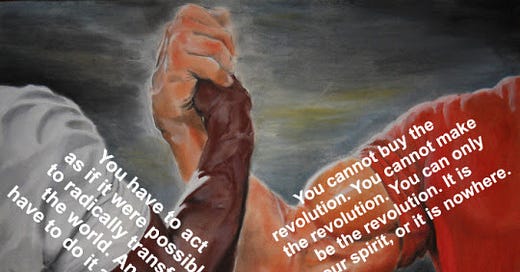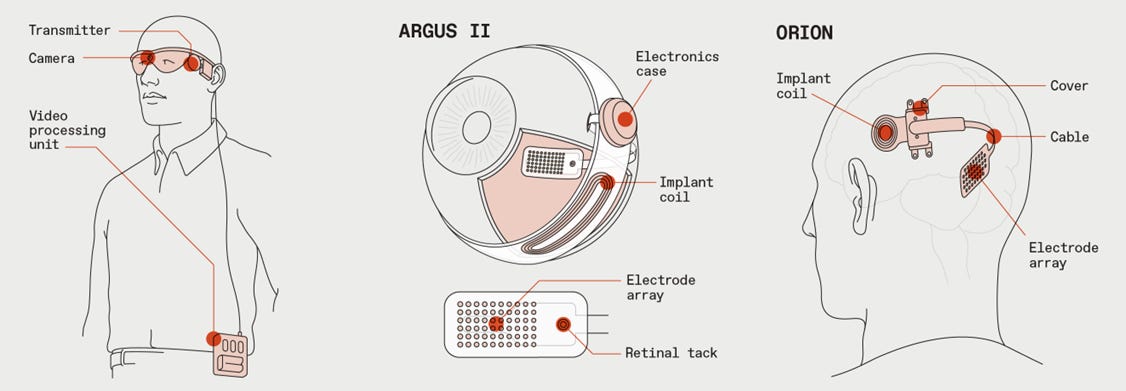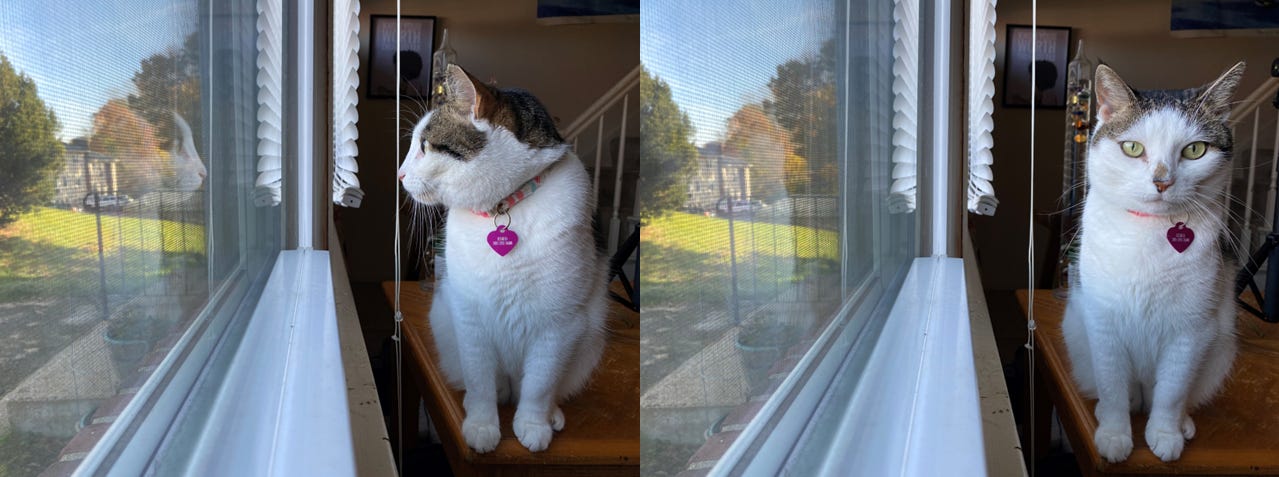Note: I am writing the following as an able-bodied person with no severe vision impairments, other than needing glasses. This obviously makes my perspective on the matter of disability justice incomplete. If anybody with knowledge on these subjects has any thoughts, leave them in the comments below, I’d love to hear from you!
[Image description: Two quotes that go hand in hand. (1) “You have to act as if it were possible to radically transform the world. And you have to do it all the time.” -Angela Davis (2) “You cannot buy the revolution. You cannot make the revolution. You can only be the revolution. It is in your spirit, or it is nowhere.” -Ursula K. Le Guin]
Happy Disability Pride Month! This week, I’d like to share a topic that I think about a lot, especially as we barrel towards (and/or are already in) another economic crisis: STEM ethics and our reliance on private companies for health care.
Early this week, I stumbled across an article about Mojo Vision’s smart contact lenses, a first-of-its-kind technology that has existed in science fiction for years. The first feature-complete version projects an AR interface that users navigate by moving their eyes, and it honestly looks really cool. Mojo is focusing on applications in sports, but in an increasingly VR/AR-focused tech industry, that could just be the beginning.
Now, I’m not known for being a pessimist (I’m notoriously, even annoyingly hopeful about the future) but after my initial excitement, my next thought was “wow, imagine how much would it stink if a buggy software update made your eyes not work”.
Well, it turns out I don’t have to imagine. Not only are recalls, updates, and maintenance issues something that people with disabilities have had to deal with for a long time, but the very next day I read about Second Sight, a medical startup that makes bionic eyes for the visually impaired. Apparently, it’s been leaving its users in the dark…literally. After merging with another company and winding down its vision-related operations, more than 350 customers who were promised lifetime support for their disability aids had to learn that “lifetime” really means “lifetime of the company”. Check out this spectacular IEEE Spectrum article to read the horrors that Second Sight customers have to experience now that there’s nobody at Second Sight to call about their product issues, from undiagnosable brain problems (due to complications in running X-rays and MRI scans with the implant) to the threat of losing vision forever if even a single device failure occurs.
[Image description: Schematics of the Second Sight Argus II, which uses eye implants as well as a brain implant and exterior equipment to beam camera images into the user’s brain. One customer, Ross Doerr, couldn’t get an x-ray at the dentist’s office or an MRI to check for a possible brain tumor because his doctors couldn’t contact Second Sight about his implant. Sketches by James Provost.]
This is deeply troubling for anybody who has a biomedical device from a small company, or who may need one someday (so potentially, the whole world). This is especially true in a world where the TSA notoriously breaks many mobility aids that they come across. Elon Musk’s Neuralink also comes to mind. While the device could do wonders for people with disabilities, will the man responsible for making electric cars that don’t let people out of the backseat if the power fails and an autopilot feature that results in a disproportionate number of crashes compared to its competitors, the man who may one day be responsible for a cascade of space junk that could forever prevent space travel, the man who continues to sexually harass his employees and segregates his factories based on race, act in the most ethical ways when it comes to making and maintaining his brain implant technology?? It’s truly anybody’s guess.
Fortunately, full-on company shutdowns are more of a concern for smaller startups like Second Sight; the Abbotts, Meditronics, and yes, even Neuralinks of the world are not likely to go out of business any time soon. Still, this brings up issues of ethics in STEM, specifically when it comes to corporate responsibility & accountability.
I spoke to my colleague Dr. Stephany Santos, biomedical engineer and phenomenal Black woman, about this story, and she agrees that this is messed up from an ethical perspective (she did not use the word “messed”). This is, after all, a company that promised a lifetime warranty and is no longer delivering. She did say that some contracts like this go void when a company goes under, but remember that Second Sight didn’t disappear, they were bought out by a drug company and are simply pursuing another direction for their products. Her idea was that there ought to be some kind of legal or financial mechanism that kicks in when a company fails to hold up their end of a warranty, such as a government loan solely for maintaining their legacy hardware. Basically, someone should be responsible for providing this kind of critical support. Let’s not lose sight of the issue here: a private company stopped taking care of their disabled customers because it stopped being profitable to do so. The profit motive is the issue, not just amoral executives.
Another big news story this past week was Canada’s internet outage which, thanks to a bad network update (and a capitalistic monopoly on Internet Service Providers), left millions of people without Internet, ATMs, or 911 emergency lines for up to 24 hours. One can imagine the implications of this. These may seem like totally disconnected stories, but the through line is this: we should not leave essential, life-saving services up to private companies.
So let’s talk action items, because this newsletter is not about doom and gloom. These stories make a strong case for 1) nationalizing critical services like electricity, health care & internet access, and 2) mutual aid and community care. In the U.S., you can plug into whatever groups are organizing for universal health care (which has seen some big updates in states like California). Just Google “health care for all” + your state and see who’s doing the work! You can provide direct aid to those in your community as well; MutualAidHub.org is a good starting point for most places, and don’t forget to talk to your neighbors!!
This requires some amount of imagination; we all need to challenge ourselves to #ImagineBetterFutures. Imagine, for example a future where you never have to worry about your electric bill going up because Eversource isn’t the only game in town. Imagine a future where health care was robust, accessible, and free, so getting regular care for your bionic eyes/limbs/whatever was as easy as getting a burrito.
Better yet, imagine if we built a world where being blind didn’t sentence you to a live of grief and harassment. A world that was fully traversable and navigable by people of all body types and impairments. I don’t trust private companies to be ethical under the profit motive of capitalism, but I don’t exactly love the government either, especially in its current form. At the end of the day, only the people can save the people. Engineers, the architects of society, need to have a hand in co-creating a better world that is accessible to all. All it takes is some radical imagination.
TL;DR- There is a better future out there, we just have to build it, and to build it, we have to dream it.
Currently Reading
A new NYT interactive piece shows how children of immigrants are the greatest contributors to the U.S. economy, debunking the racist myths that open border policies make communities poorer. To quote the article…
While “first-generation immigrants are more costly to governments than are the native-born,” according to a 2017 report by the National Academies of Sciences, Engineering and Medicine, the “second generation are among the strongest fiscal and economic contributors in the U.S.”
…It’s also a reminder to white leftists (like me) that our usual rhetoric (“America is terrible and evil, we are all suffering, especially people of color”) may require a bit more nuance. While I do still believe that this is true, it isn’t exactly convincing to many immigrants or children of immigrants, whom we claim to want to embrace and uplift.
The notion that immigrants have become a permanent underclass, isolated from the American mainstream, is popular among immigration restrictionists — as well as among some pro-immigration groups that say immigrants need more help to break out of poverty. The truth is that today’s immigrants are advancing just as swiftly as those of the past.
Watch History
This video by SomeOrdinaryGamer gives a good explanation of how the Canadian internet outage went down, complete with visuals showing exactly how the modern internet is connected.
Two excellent videos about why the Kardashians are moving away from appropriating the aesthetics of people of color, one from Kimberly Nicole Foster (aka For Harriet) and one from NappyHeadedJojoba.
Bops, Vibes, & Jams
The new Superorganism album is here and it’s terrific, especially if you love abrasive pop that occasionally reminds you how much money Jeff Bezos makes per second.
Every now and again, I’m able to find new, gay little songs because of artists self-promoting on TikTok. My latest find is “Girl, I Wanna Be Your Girlfriend” by Black queer artist Tessa Kaye. It’s mad cute!!
Quick Actions
#ChangeYourAlgorithm: Follow Erin Reed’s new Substack (and all her other socials) to stay updated on the many anti-trans bills sweeping the country. Erin has done an excellent job documenting these for a long time, but earlier this year I mentored her on how to succeed on TikTok, and now she’s surpassed me in followers! Not that I’m jealous or anything…
Want to support Black trans people today? Here are two places to donate: 1) Thrive House, the only Black trans shelter in Texas who are at risk of losing their housing (spot.fund/thrivehouse) or 2) fellow TikToker @SistaYiddishkeit’s Cashapp to support their Black trans friend’s medical needs directly ($ymcmedia).
Tangents
The JWST gave us gorgeous new images recently, which were well-meme’d online. Let’s not forget that James Webb, the telescope’s namesake, was homophobic and that some are calling for the its renaming. Dr. Chanda Prescod-Weinstein, a prominent Black queer Jewish astrophysicist, has called it the Just Wonderful Space Telescope, and has recently started advocating for renaming it after Harriet Tubman.
Speaking of Disability Pride Month, remember that inclusion of people with invisible disabilities is important too! This guide by Microsoft is a great toolkit for people who want to make their designs more inclusive to those with dyslexia, autism, ADHD, and more. UConn’s School of Engineering also recently launched their own Neurodiversity program to give neurodiverse students resources to thrive and to help instructors who want to make their classrooms more accessible. My alma mater is making me proud!! #GoHuskies
And now, your weekly Koko.
That’s all for now! See you next week with more sweet, sweet content.
In solidarity,
-Anna






